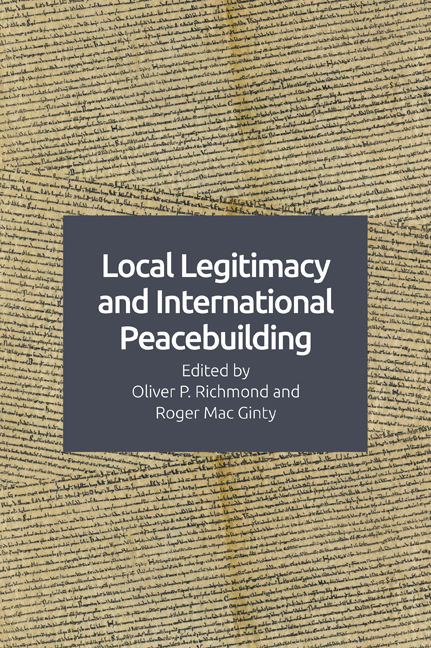Book contents
- Frontmatter
- Contents
- Contributors
- Foreword: The Riddle of Legitimacy
- Introduction: Legitimacy and Peace in the Age of Intervention
- One The Hybridization of Legitimacy in Processes of Peace Formation: the Bougainville Case
- Two International Intervention and Relational Legitimacy
- Three From a Divisive Peace Agreement to a Legitimate Peace in Colombia
- Four Banners, Billy Clubs and Boomerangs: Leveraging and Counter-Leveraging Legitimacy in the Occupied Palestinian Territory
- Five Peacebuilding as a Self-Legitimising System: The Case of Bosnia-Herzegovina
- Six ‘We Are There at Their Invitation’: Struggles for Legitimacy during the US Coalition Invasion–Occupation of Iraq
- Seven Inclusion and Performance as Sources of Legitimacy – the UN Mediation on Syria
- Eight Agonisation to Re-Legitimise the Postcolonial, Post-Conflict Somaliland
- Nine Third Party Legitimacy and International Mediation: Peacemaking through Pan-Africanism in Sudan
- Ten Post-War Legitimacy: A Framework on Relational Agency in Peacebuilding
- Eleven Legitimacy in Lebanon
- Conclusion: Peacebuilding and Legitimacy: Some Concluding Thoughts
- Index
Conclusion: Peacebuilding and Legitimacy: Some Concluding Thoughts
Published online by Cambridge University Press: 17 November 2020
- Frontmatter
- Contents
- Contributors
- Foreword: The Riddle of Legitimacy
- Introduction: Legitimacy and Peace in the Age of Intervention
- One The Hybridization of Legitimacy in Processes of Peace Formation: the Bougainville Case
- Two International Intervention and Relational Legitimacy
- Three From a Divisive Peace Agreement to a Legitimate Peace in Colombia
- Four Banners, Billy Clubs and Boomerangs: Leveraging and Counter-Leveraging Legitimacy in the Occupied Palestinian Territory
- Five Peacebuilding as a Self-Legitimising System: The Case of Bosnia-Herzegovina
- Six ‘We Are There at Their Invitation’: Struggles for Legitimacy during the US Coalition Invasion–Occupation of Iraq
- Seven Inclusion and Performance as Sources of Legitimacy – the UN Mediation on Syria
- Eight Agonisation to Re-Legitimise the Postcolonial, Post-Conflict Somaliland
- Nine Third Party Legitimacy and International Mediation: Peacemaking through Pan-Africanism in Sudan
- Ten Post-War Legitimacy: A Framework on Relational Agency in Peacebuilding
- Eleven Legitimacy in Lebanon
- Conclusion: Peacebuilding and Legitimacy: Some Concluding Thoughts
- Index
Summary
The simple horizontal and vertical alignment of multiple legitimacies into common, central authorities as the basis for an evolved and ethical peace appears to be an oversimplification of a very complex process. Too much substance is lost in its simplification, as is well illustrated in Roger Mac Ginty and Kristina Tschunkert's chapter on Lebanon, which follows Boege’s deployment of hybridity in understanding the realities of legitimate authority in modern conflict-affected societies. Visoka's chapter on Kosovo underlines the relationality of contemporary legitimate authority, something which peacebuilding has mostly missed, and all of the other chapters confirm variations of this theme. Much of this argumentation indicates that effective peacebuilding needs to understand the special complexities of relational political legitimacy across life-worlds and levels of analysis far better if it is to be more successful. A localised view of legitimacy creates a number of different and contradictory demands in the context of the nature of the state and its performance, as well as towards the international community. These point beyond the usual understandings of modern legitimacy emanating from civil society and within a liberal social contract, which may be weakly extended to international institutions and law, however, including the balancing of social justice and human rights with identity, long-standing institutions, patterns of authority and law.
It is clear that social legitimacy – perhaps linked to kinship, religion or identity – is not always aligned with the state or with international norms. Yet, international actors have intervened in the post-Cold War environment as if local and state forms of legitimacy authority should be aligned with international law and norms. Indeed, enormous efforts have been made by international actors in multiple contexts to try to train, mentor and encourage local forms of legitimacy to adapt to internationally-recognised forms. This institutional isomorphism seems to have failed to recognise that different types of legitimacy are at work in different domains and that all of them contribute to a complex assemblage of power, legitimacy, patronage and logics. The empirical evidence amassed so far shows that convergence is an unlikely goal, if not impossible, and that in fact the multiple forms of legitimacy at work in post-war contexts normally diverge. This implies that legitimacy is likely to rest on a divergence rather than convergence between custom, practice, national or international law, a very tricky proposition indeed for any rationality-based international order.
- Type
- Chapter
- Information
- Local Legitimacy and International Peace Intervention , pp. 261 - 285Publisher: Edinburgh University PressPrint publication year: 2020



